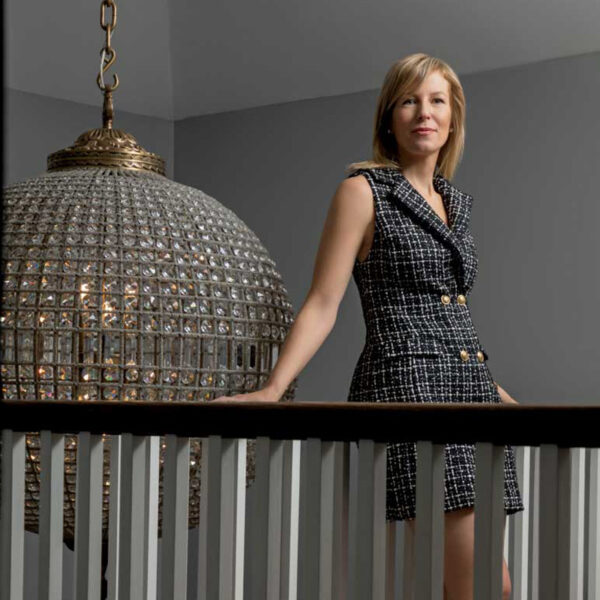GRANTING PARENTHOOD
By Julie Mangurten Weinberg
PHOTOGRAPHY BY MARIA PONCE
STYLING BY THERESA DEMARIA
HAIR & MAKEUP BY CATHLEEN HEALY
Dr. Eve Feinberg wearing alice + olivia black and white double breasted dress, Neiman Marcus
By Julie Mangurten Weinberg
PHOTOGRAPHY BY MARIA PONCE
STYLING BY THERESA DEMARIA
HAIR & MAKEUP BY CATHLEEN HEALY
Dr. Eve Feinberg wearing alice + olivia black and white double breasted dress, Neiman Marcus

When Dr. Eve Feinberg struggled to conceive a child, she gained firsthand knowledge of exactly how expensive infertility treatments could be.
“My own experiences were both humbling and eye-opening. They made me realize that if the process is this difficult for me as somebody who has the knowledge, the expertise, the training, good healthcare, and is in the field, how are my patients doing this?” says the Highland Park mother of three teens.
As a Reproductive Endocrinology and Fertility Specialist at Northwestern Medicine, Feinberg sees many of her patients struggle to pay for treatment. “They’re putting payments on credit cards, and they’re mortgaging their houses—they’re financially stressed,” she explains. “You see these amazing people who so badly want to become parents but are unable to even try because their health insurance does not provide coverage and they cannot afford treatment. They have mountains to move to get to the point where they can afford to have a chance to try. As if infertility isn’t hard enough.” In fact, infertility affects one in eight couples in the United States.
In 2013, Feinberg, along with Dr. Jennifer Hirshfeld-Cytron, launched the Chicago Coalition for Family Building. The mission of the organization is to provide both educational and financial support for individuals and couples struggling with infertility. The organization was originally launched to honor the legacy of Dr. Kevin J. Lederer, a reproductive endocrinologist and infertility specialist who died after battling cancer. As the organization grew to encompass nearly every fertility practice in Chicagoland, the group became the Chicago Coalition for Family Building to reflect its widespread community efforts.
The nonprofit organization hosts educational webinars and offers two different types of grants, either a financial grant or a donated services grant that might include a donated IVF cycle, donated genetic testing, or donated medications. Financial grants are typically for up to $10,000 but last year the Coalition awarded $75,000 to a family to help with the cost of using a gestational carrier.
“There are a lot of working couples who make a decent living but don’t have insurance coverage and simply cannot afford to access IVF,” explains Feinberg.
By networking with her colleagues, Feinberg recruited more than 75 percent of all IVF practices in Chicagoland to donate one cycle of IVF annually through the coalition. Since its inception, the coalition has awarded more than $2 million in grants; a generosity that has led to 74 live births.
The Chicago Coalition for Family Building is not Feinberg’s first foray into volunteerism. As a college student at Emory University, she served as the President of Volunteer Emory. Her responsibilities included making phone calls to alumni asking for donations. “I realized that a little bit of money from a lot of people would go a long way to help a large group of people,” she says.
The organization raised enough money to bus Emory students to inner city Atlanta to teach reproductive health to high school girls. “I taught topics like hygiene, menstruation, safe sex, all of those embarrassing ones that people don’t always teach,” she explains, “It was one of my most rewarding experiences.”
Feinberg became interested in reproductive health at an unusually early age. “My mom was pregnant with my younger brother when I was 5. And I was insanely fascinated with where babies came from, not so much the sex part of it, but the reproduction part of it, the sperm, the egg, the embryo,” she recalls.
Not surprisingly, Feinberg knew as a child that she wanted to go to medical school. However, as a high school student she considered a future in theater, performing in school productions at Glenbrook North High School and attending summer theater camp in upstate New York. The stage skills Feinberg learned then have continued to serve her well. “Some of the improvisation you learn in theater, some of the empathy and communication, and some of the ability to read people and emotions are really helpful in connecting with other people as a physician.”
Feinberg credits a supportive husband, extended family, and a village of friends for helping her handle her busy life along with “incredible organizational management skills” and a healthy attitude.
“I give myself grace in understanding that I am one person and I’m not going to be the best at everything every single day but I’m always going to try my hardest. I also think about seeing the big picture, not sweating the things that are not important,” she says.
One thing is consistently important to Dr. Feinberg—the quest for parenthood. “I truly believe that people who want to become parents will become parents. There’s always a workaround in terms of treatment or alternative treatment or adoption. We can’t always fix some of the biological issues, but we can always fix the financial issues.”
For more information, visit coalitionforfamilybuilding.org.
Sign Up for the JWC Media Email